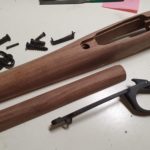Some trailers and RV’s have an external propane hookup for an outside propane stove. Mine did not but I had a cheapo $20 butane stove and I wondered if butane could do the trick for me?
Long ago, we used to use white gas stoves. Those were eventually ditched in favour of the iconic green Coleman 2 burner stoves that ran on little green propane bottles or adapter hoses. Those are still ubiquitous and a good choice, but weren’t optimal for what I wanted because:
- I wanted a burner and a grill. Burners are only really good for boiling water in a kettle or cooking food in a frying pan. I wanted a grill for hot dogs, burgers, etc.
- All the propane grills I saw were either expensive or super bulky. Bulky grills are a pain in the ass to pack into a popup tent trailer where storage is low.
Why don’t more people use butane stoves/grills for camping?
If you have an outside propane hookup on your trailer/RV and a spot to mount it on the wall of the RV/trailer, propane is the right fuel to use. It’s convenient, you’ll use the big tanks instead of smaller ones, and you’ll likely have a quick hookup.
For portable stoves, it’s mostly because of history. Butane used to be more expensive and it used to be harder to get a hold of. An 8oz can of butane today is around $3-5 CAD while a 16oz propane bottle is $6-9. Those mini green propane bottles are readily available and some people even have adapters to run off a 20lb propane bottle.
Propane stoves are generally pretty durable and come with wind blockers to try to keep the flame from blowing out.
Propane also works at sub-zero temperatures while butane does not. In the pic below, I’m heating up a butane cannister because it was well below freezing and wouldn’t work that cold.

Butane Stove Advantages

Butane stoves and grills are cheaper and more compact. That red stove on the left cost me $15, while the butane grill next to it was $50 on sale. I’ve seen some propane stoves that do stove+grill in a combo unit but they either had a really crappy grill or they cost an arm and a leg. Both my butane stoves store a cannister of gas inside. Your mileage my vary but the red butane stove pictured boils water faster than the propane stove inside my tent trailer. Cans of butane will last 2-4 hours.

There’s also no screwing cannisters onto a regulator or adapter. Empty butane cans can be swapped in 5 seconds. Both my butane stoves have ignitors that work every time and the dials can regulate the flame VERY well. Too low and it’ll blow out but I don’t really have many flame blowout issues with mine even without the wind blockers.

So in a word: Convenience. Butane stoves are very convenient to use, store, start, and refuel. That’s why I like mine for the kind of camping I do.
What about Isobutane and compact ultralight stoves?
If you hike or enjoy very compact cook systems, ultralight stoves that run off isobutane are excellent. They are the most compact, optimal way to boil water for dehydrated meals while ultralight hiking or for a day at the range when a hot meal is needed.
For trailer camping, I don’t use mine very often. They need a steady position to boil water on and if I’m camping with my kids, they might bump the table and send my boiling water flying. The fuel costs more, you have to assemble the stove and screw it onto the cannister. Just not as convenient as the plain butane stoves.





